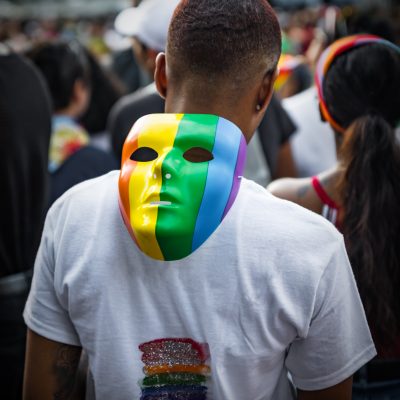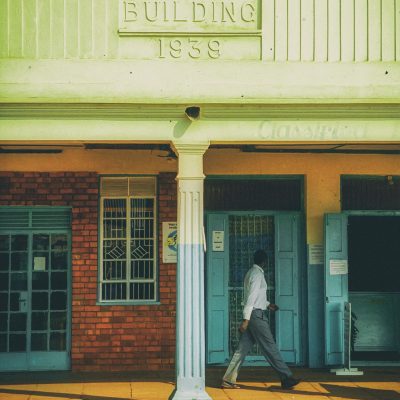Details
Article
Senior Fellow Tanja Dittfeld is a doctoral researcher, research assistant and lecturer at The University of Sydney.
COVID-19 is effectively being used as a smokescreen to target marginalised and vulnerable populations, restrict civil society space and increase political power in a number of countries such as Hungary, Poland and now Uganda.
In Uganda, 23 LGBTQ+ youth were arrested during the raid on the Children of the Sun Foundation (COSF) Shelter in Kyengera, on the outskirts of Uganda’s capital Kampala, on March 29th 2020. 19 of them remain detained without access to court, legal representation and medication at least until April 29th, 2020. The charge against the 19 detained is “a negligent act likely to spread infection of disease” and “disobedience of lawful orders,” meaning that they were allegedly violating the directive to socially distance by simply residing in the shelter.
“COVID-19 is effectively being used as a smokescreen to target marginalised and vulnerable populations, restrict civil society space and increase political power…“
Homophobia in the time of Corona
“What these examples of arbitrary arrests and detentions demonstrate is that homosexuality in Uganda is not purely a legal issue. [H]omosexuality and more precisely homophobia is a deeply political and social issue.“
Despite the charges, the legal aid group Human Rights Awareness and Promotion Forum (HRAPF) assert that the arrest and detention were motivated by homophobia. Not only was the raid prompted by neighbors’ complaints about the presumed (homo)sexuality of shelter residents, but Human Rights Watch claim to be in possession of a video showing the mayor of Nsangi municipality berating residents for “homosexuality” and beating them with a stick.
In 2009, Uganda became infamous for its Anti-Homosexuality Bill, colloquially known as the ‘Kill Bill’ or ‘Kill the Gays Bill’ because of its original proposition to include death penalty for aggravated homosexuality. While the Anti-Homosexuality Act was revoked in 2014, only months after it was signed into law, same-sex conduct is still criminalised in sections 145, section 146 and section 148 of the colonial Penal Code of 1950.
Despite the Anti-Homosexuality Act being revoked, arbitrary arrests and detention of LGBTQ+ people such as the one at COSF shelter is by no means a standalone. Another recent example took place in October 2019 when 16 activists with Let’s Walk Uganda, a community-based organization working on economic empowerment for LGBTQ+ youth were arrested, detained and charged with “carnal knowledge against the order of nature”, and then subjected to forced anal examination before they were released on bail in early November 2019. Later, in November 2019, police also raided LGBT-friendly ‘RAM Bar’ in Kampala, during which 127 people were arrested and 67 hereof reportedly charged with nuisance offenses.
“While the scale and severity of COVID-19 may justify the measures imposed in Uganda, these measures must be enacted for a legitimate reason. The raid, arrest and charge against the LGBTQ+ youth suggest otherwise.“
What these examples of arbitrary arrests and detentions demonstrate is that homosexuality in Uganda is not purely a legal issue. Nor is it, as otherwise often assumed, purely a religious issue whereby Ugandans are merely the puppets of USA Evangelical Christians as many Ugandans irrespective of their beliefs oppose homosexuality. As demonstrated by Lydia Boyd, an associate professor with the University of North Carolina, through long-term ethnographic fieldwork in Uganda, homosexuality and more precisely homophobia is a deeply political and social issue. Homosexuality is, in short, considered to be a result of Western influence and against Ugandan culture.
From COVID-19 response to repression
In the aftermath of the World Health Organisation (WHO) declaring COVID-19 a global pandemic, African countries were urged to prepare themselves for the worst as the virus is likely to stretch already fragile health systems to a breaking point. Even before the first confirmed corona case on March 22 2020, the Ugandan government responded resolutely to the COVID-19 threat by imposing continuously expanding restrictions and bans such as closing all bars, hotels and borders, banning all public and private transport and non-food markets, closing all public court hearings, instituting a night-time curfew, closing shopping malls, and most recently banning outdoor exercise on April 8 2020.
While the scale and severity of COVID-19 may justify the measures imposed in Uganda, measures must be enacted for a legitimate reason. Echoing a press statement by UNAIDS Geneva on April 9 2020, a legitimate reason would entail that measures are proportionate to the aim, necessary, non-arbitrary, evidence-informed and lawful. The raid, arrest and charge against the LGBTQ+ youth suggest otherwise.
“Like other infectious diseases, COVID-19 poses a higher risk to populations living in confined spaces, and this risk is particularly acute in places of detention such as prisons and jails.”
The raid and subsequent charge against the LGBTQ+ youth firstly do not meet the rule-of-law requirement for criminalisation. Police stated that the arrest enforced presidential directives to prevent the spread of COVID-19 including the prohibition of gatherings above 10 people. However, at the time of the raid, there was no directive limiting the number of residents in private homes or shelters.
Adding to this is that the detained LGBTQ+ people are denied legal representation. While HRAPF have applied to visit the detainees, their application has been denied by the Ministry of Work and Transport as the bans on public and private transport only make exceptions for essential services which do not include legal services.
Like other infectious diseases, COVID-19 poses a higher risk to populations living in confined spaces, and this risk is particularly acute in places of detention such as prisons and jails. The arrest and detainment not only contrast with this evidence-based knowledge, but also collide with Ugandan civil society organisations such as Chapter Four advocating for the release of prisoners to decongest Uganda’s prisons to protect detainees and staff from COVID-19.
The continued detention of the 19 LGBTQ+ youth not only heighten the risk of them contracting COVID-19 but also prevent their access to testing, preventative care, and treatment. The arrest and detention of the LGBTQ+ youth are clearly counterintuitive to and not motivated by the containment measures.
#StayHomeSaveLives (in Uganda)
“In 2009, Uganda became infamous for its Anti-Homosexuality Bill, colloquially known as the ‘Kill Bill’ or ‘Kill the Gays Bill’ because of its original proposition to include death penalty for aggravated homosexuality.”
Whatever has happened and will happen to the 19 LGBTQ+ people detained without access to a court, legal representation or medication is undoubtfully the responsibility of the Ugandan government.
Past and present pan/epidemics have however demonstrated that an effective response to health crises such as COVID-19 must be rooted in trust, solidarity and unwavering respect for human rights. Should you, I, or we want to contribute to an effective response to the current pandemic, we must break free from our obsession with the numbers of cases, recoveries and deaths and direct our attention and efforts to the lived realities of marginalised and vulnerable groups within and outside of our respective country.
Beyond digital activism, most LGBTQ+ civil society organisations are in dire need of economic support to respond effectively and efficiently to the COVID-19 emergency and its implications for LGBTQ+ people in terms of food, shelter, medication, and human rights violations. This could be in the form of crowdsourced fundraising – your next online get-together-idea? – or direct donations to existing LGBTQ+ organisations.
“Past and present pan/epidemics have however demonstrated that an effective response to health crises such as COVID-19 must be rooted in trust, solidarity and unwavering respect for human rights.”
While there are certainly LGBTQ+ civil society organisations and people in need of economic – and after COVID-19 human – support in your country, it is arguably more pressing to direct attention, efforts and means to LGBTQ+ organisations in countries that are characterised by (re)criminalisation of LGBTQ+ people, acts and organisations, weak healthcare systems, limited or non-existing social safety nets and an absence, for whatever reason, of financial policies to buffer the economic impact of COVID-19 for individuals and organisations.
Two organisations that have been vital in responding to and supporting the arrested and detained LGBTQ+ youth in Uganda that you could consider supporting are:
Formed in 2004, SMUG is a non-profit umbrella organisation based in Kampala. SMUG advocates for policy reform to ensure a liberated LGBTQ+ community while also monitoring and aiding the efforts of more than 20 LGBTQ+ organisations and networks across Uganda.
HRAPF is a non-governmental human rights advocacy organisation whose mission is to promote respect and protection of human rights of marginalised persons.
There are of course many more organisations that you could consider supporting in- and outside of Uganda. However, to, for the first and probably only time in my life, quote Boris Johnson, now is the time to #StayHomeSaveLives. Whose lives you save and how you do it is up to you.





